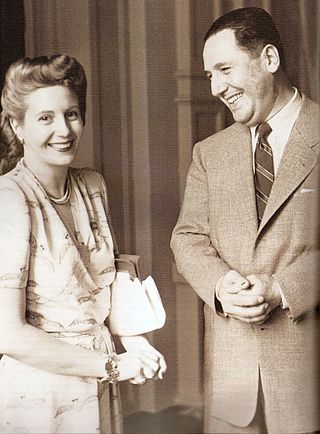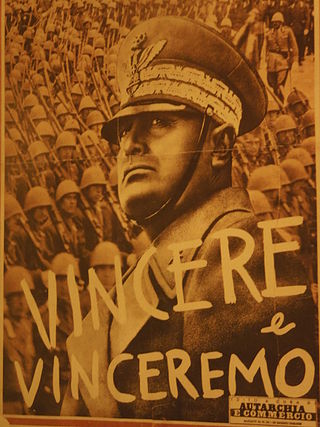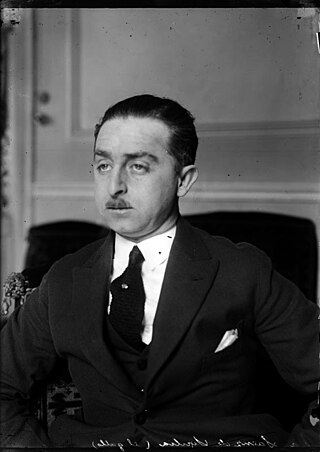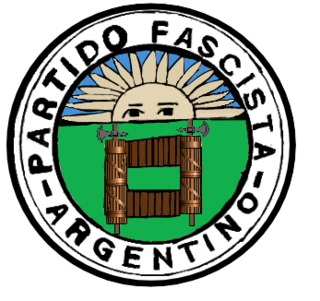
Peronism, also known as justicialism, is a labour and left-leaning Argentine political movement based on the ideas and legacy of Argentine ruler Juan Perón (1895–1974). It has been an influential movement in 20th- and 21st-century Argentine politics. Since 1946, Peronists have won 10 out of the 14 presidential elections in which they have been allowed to run.
The relations between the Catholic Church and the state have been constantly evolving with various forms of government, some of them controversial in retrospect. In its history, the Church has had to deal with various concepts and systems of governance, from the Roman Empire to the medieval divine right of kings, from nineteenth- and twentieth-century concepts of democracy and pluralism to the appearance of left- and right-wing dictatorial regimes. The Second Vatican Council's decree Dignitatis humanae stated that religious freedom is a civil right that should be recognized in constitutional law.

The Confederación Española de Derechas Autónomas was a Spanish political party in the Second Spanish Republic. A Catholic conservative force, it was the political heir to Ángel Herrera Oria's Acción Popular and defined itself in terms of the 'affirmation and defence of the principles of Christian civilization,' translating this theoretical stand into a political demand for the revision of the anti-Catholic passages of the republican constitution. CEDA saw itself as a defensive organisation, formed to protect religious toleration, family, and private property rights. José María Gil-Robles declared his intention to "give Spain a true unity, a new spirit, a totalitarian polity..." and went on to say "Democracy is not an end but a mean to achieve the conquest of the new state. When the time comes, either parliament submits or we will eliminate it." The CEDA held Fascist-style rallies, called Gil-Robles "Jefe", the Castillian Spanish equivalent to Duce, and sometimes debated whether CEDA might lead a "March on Madrid" to forcefully seize power.

The Vlaamsch Nationaal Verbond, widely known by its acronym VNV, was a Flemish nationalist political party active in Belgium between 1933 and 1945. It became the leading force of political collaboration in Flanders during the German occupation of Belgium in World War II. Authoritarian by inclination, the party advocated the creation of a "Greater Netherlands" (Dietsland) combining Flanders and the Netherlands.

Verdinaso, sometimes rendered as Dinaso, was a small fascist political movement active in Belgium and, to a lesser extent, the Netherlands between 1931 and 1941.

The history of fascist ideology is long and it draws on many sources. Fascists took inspiration from sources as ancient as the Spartans for their focus on racial purity and their emphasis on rule by an elite minority. Fascism has also been connected to the ideals of Plato, though there are key differences between the two. Fascism styled itself as the ideological successor to Rome, particularly the Roman Empire. From the same era, Georg Wilhelm Friedrich Hegel's view on the absolute authority of the state also strongly influenced fascist thinking. The French Revolution was a major influence insofar as the Nazis saw themselves as fighting back against many of the ideas which it brought to prominence, especially liberalism, liberal democracy and racial equality, whereas on the other hand, fascism drew heavily on the revolutionary ideal of nationalism. The prejudice of a "high and noble" Aryan culture as opposed to a "parasitic" Semitic culture was core to Nazi racial views, while other early forms of fascism concerned themselves with non-racialized conceptions of the nation.

The Revolutionary Mexicanist Action, better known as the Gold Shirts, was a Mexican fascist, secular, anti-Semitic, anti-communist, ultra-nationalist paramilitary organization, originated in September 1933 in Mexico City and operated until disbanded in 1936. With ultra-nationalist, strikebreaking roots and Nazi German support, the organization sought to expel Chinese, Jews, and communists from Mexico. The organization often violently engaged with labor movements associated with the Mexican Communist Party and with labor strikers.

Fascist movements in Europe were the set of various fascist ideologies which were practiced by governments and political organizations in Europe during the 20th century. Fascism was born in Italy following World War I, and other fascist movements, influenced by Italian Fascism, subsequently emerged across Europe. Among the political doctrines which are identified as ideological origins of fascism in Europe are the combining of a traditional national unity and revolutionary anti-democratic rhetoric which was espoused by the integral nationalist Charles Maurras and the revolutionary syndicalist Georges Sorel.

The Croix-de-Feu was a nationalist French league of the Interwar period, led by Colonel François de la Rocque (1885–1946). After it was dissolved, as were all other leagues during the Popular Front period (1936–38), La Rocque established the Parti social français (PSF) to replace it.
Fascist movements gained popularity in many countries in Asia during the 1920s.
Juan Emiliano Carulla was an Argentine physician and nationalist politician. He was most prominent under the military regime in power during the early 1930s.

The 1943 Argentine coup d'état, also known as the Revolution of '43, was a coup d'état on 4 June 1943 that ended the government of Ramón Castillo, who had been fraudulently elected to the office of vice-president before succeeding to the presidency in 1942 as part of the period known as the Infamous Decade. The military was opposed to Governor Robustiano Patrón Costas, Castillo's hand-picked successor, a major landowner in Salta Province and a primary stockholder in the sugar industry. The only serious resistance to the military coup came from the Argentine Navy, which confronted the advancing army columns at the Navy Petty-Officers School of Mechanics.

Gustavo Sáenz de Sicilia Olivares, was a Mexican silent film director, producer, journalist, civil engineer, and founder of Compañía Nacional Productora de Películas. Sáenz de Sicilia is regarded as an important figure during the silent era of Mexican cinema as well as a key influence for the Golden Age of Mexican cinema. Throughout his life, he wrote for Excélsior under the pen name Ingeniero Gallo.

The Argentine Fascist Party was a fascist political party in Argentina from 1932 until its official disbandment in 1936, when it was succeeded by the National Fascist Union. Founded by Italian Argentines, the party was formed as a breakaway faction from Argentina's National Fascist Party. It was based upon Italian fascism and was recognized by Benito Mussolini's National Fascist Party in 1935. In the 1930s the party became a mass movement, particularly in the Córdoba reguon. Nicholás Vitelli led the PFA's branch in Córdoba until his death in 1934, when Nimio de Anquín took the leadership of the party.
British fascism is the form of fascism which is promoted by some political parties and movements in the United Kingdom. It is based on British ultranationalism and imperialism and had aspects of Italian fascism and Nazism both before and after World War II.

The Nationalist Liberation Alliance, originally known as the Argentine Civic Legion from 1931 to 1937, the Alliance of Nationalist Youth from 1937 to 1943, and then using its final name from 1943 to 1955, was a Nacionalista and fascist movement.

National syndicalism is a far-right adaptation of syndicalism to suit the broader agenda of integral nationalism. National syndicalism developed in France in the early 20th century, and then spread to Italy, Spain, and Portugal.

The Centre Party, or the Centre Reform Group, and occasionally referred to as the Centre Movement, was a short-lived extreme-right political party that operated in the Australian state of New South Wales. Founded in December 1933, the party's leader and most prominent figure was Eric Campbell, the leader of the paramilitary New Guard movement. That organisation had been established to oppose what its members perceived as the socialist tendencies of Jack Lang, the Premier of New South Wales, but declined following Lang's dismissal in early 1932. The party, unlike most fascist-oriented parties in Europe, acted as a wing of its more prominent paramilitary arm.

The Irish Christian Front (ICF) was a Catholic organisation that existed from August 1936 to October 1937. The organisation was founded with the intention of showing support and raising funds for the Nationalist faction of the Spanish Civil War. However, it quickly developed a domestic political agenda that was in opposition to the Irish government of the day. The ICF was able to send a substantial amount of money and supplies to the Nationalists but its domestic policies were never adopted.
















